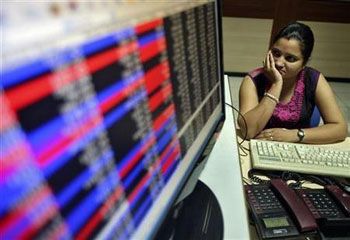 Continue SIPs, look at other foreign funds to protect your portfolio and even benefit from the uncertainty
Continue SIPs, look at other foreign funds to protect your portfolio and even benefit from the uncertainty
In May 2013, when former US Federal Reserve chairman Ben Bernanke gave the first hint that quantitative easing, which supplied additional liquidity to the market, would be tapered off, foreign institutional investors started withdrawing money aggressively from the Indian market.
In three months, the rupee fell from Rs 55.66 against the dollar to Rs 68.83.
Even the Sensex took a hit, falling from 20,062 (May 22) to 17,906 (August 21).
While the jury is still out whether Brexit, or Britain’s exit from the European Union, will have a similar impact on the rupee and markets, the initial pain hasn’t been too bad, as the Sensex has taken a hit of only 2.22 per cent.
Whether the markets go southward or not, investors can be sure of one thing, high volatility till things settle down.
According to experts, volatility could last for three months or even more.
And investors should be prepared for this and not take hasty steps.
More importantly, the EU issue may remain on the boil for several months as more countries clamour to quit the bloc.
If the region’s uncertainty leads to a flight of global capital to safe havens, emerging markets such as India could witness a vicious cycle of FII outflows, weakening currency, and yet more outflows (a weak rupee pulls down FIIs’ dollar returns).
So far, Indian mutual funds (MFs) appear to have emerged relatively unscathed from Brexit.
Most categories of diversified equity funds have fared better.
Large-cap funds are down only -1.59 per cent on an average since Brexit (between 23 and 27 June).
Multi-cap (-1.01 per cent), mid-cap (-0.95 per cent) and small-cap (-0.38 per cent) funds have lost even less.
“Returns of MFs show that there hasn’t been any significant damage to investors’ portfolios so far,” says Manoj Nagpal, chief executive officer, Outlook Asia Capital. Hence, there is no reason to panic—at least not yet.
For long-term investors, the simple but effective strategy to counter high volatility would be to continue with SIPs.
“By continuing with your SIP, you will be able to lower your average cost of purchase of fund units,” says Srikanth Meenakshi, founder and chief operating officer, Fundsindia.com.
If you buy at lower levels in a volatile market, it could potentially boost your long-term returns.
Don’t score an own goal by either stopping SIPs or selling your equity fund holdings.
To safeguard against the twin risks of domestic market volatility and rupee depreciation, diversify your portfolio internationally.
Those with a well-diversified domestic equity portfolio may invest 10-15 per cent of it in international funds.
“Invest in diversified global funds and US-focused funds for international exposure,” says Dhaval Kapadia, director-investment advisory, Morningstar Investment Advisor India.
Four Europe-focused funds in India (total assets under management of Rs 202.75 crore) have on an average declined 16.51 per cent over the past year.
“Reduce exposure to Europe-focused funds as the uncertainty in the eurozone is likely to continue for a long time,” says Nagpal.
A crisis like Brexit also brings home the significance of shifting your investments out of the equity markets at least a couple of years in advance of reaching your goal.
A sudden downturn will then not put the achievement of your goal in jeopardy.
Finally, stocks with high FII holdings are being viewed as vulnerable to a sell-off.
Smart investors can, however, turn this into an opportunity.
“If your fundamental analysis shows that these stocks have good prospects and are attractively valued, an FII sell-off can be used to raise holding in these stocks,” says Kapadia.

.jpg)










 © 2025
© 2025